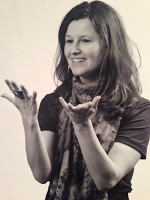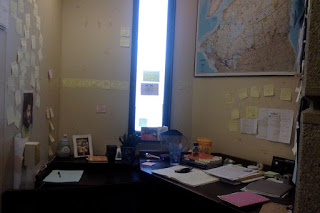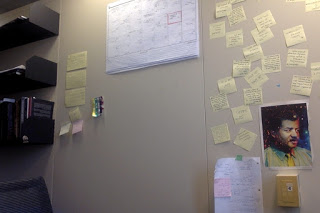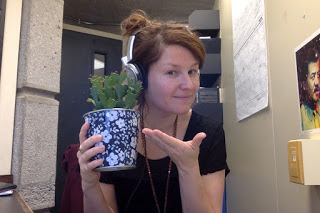I am Ashley Williamson and This is How I Work
 Today, I am interviewing Ashley Williamson for the “How I Work” series. Ashley has a BA (Hons.) in English and Drama from Queen’s University and an MA in Theatre Studies from York University. She is currently in her third year of a PhD at the Centre for Drama, Theatre and Performance Studies at the University of Toronto. Her research on Historical Sites and the performances that happen at them is taking her on a cross Canada road trip this summer.
Today, I am interviewing Ashley Williamson for the “How I Work” series. Ashley has a BA (Hons.) in English and Drama from Queen’s University and an MA in Theatre Studies from York University. She is currently in her third year of a PhD at the Centre for Drama, Theatre and Performance Studies at the University of Toronto. Her research on Historical Sites and the performances that happen at them is taking her on a cross Canada road trip this summer.
Current Job: Third Year PhD Student (includes RA and TA work)
Current Location: University of Toronto
Current mobile device: iphone
Current computer: mac book air 13 inches
Can you briefly explain your current situation and research to us?
I am preparing for a summer long research road trip that will take me all over Canada. I work out of the Centre for Drama, Theatre and Performance Studies and I research the use of performance in National Historic Sites – so the costumed animators at Forts, Historic Houses and Farms, or Settlements. I am interested how these performers interact with the visitors, what historical elements are emphasis or not in the performances and whether or not a national narrative is emerging, piece by piece, at all these places. This trip and research means I am finishing up my ethics review, planning my route and writing my prospectus simultaneously. It is … stressful just now.
What tools, apps and software are essential to your workflow?
I am a list maker and each item on the list has an estimated time the task will take and box to tick when the task it done. These accountability features are relatively new but they make sure I don’t have 35 item daily lists. Long daily lists are just a way to set yourself up for disappointment or a sneaky way of getting out of doing anything.
I use Evernote to track notes, websites links and documents related to all my projects – academic or otherwise. I read on lifehack.com that best way to use Evernote was to use it for everything. I like that the app is linked between my computer and phone. It means that all the pictures I take on my iPhone of things I need to remember have a labelled place to go. I also save drafts of important emails I have written in Evernote so I can pillage them for phrases and ideas.
I write with Scrivener but only for long works that need to be sectioned off so I don’t lose track – like lit reviews, journal articles and eventually my dissertation. I use Pages/Word for all other writing – it is clumsy and not quite right but… I don’t have time to find
anything better.
I am also heavily dependent on a giant wall calendar, paper agenda, legal pads, coloured pens, sharpies, post-it notes. I use the wall of my carrel to chart out my projects visually and to record how much time I have spent on them. I often need to chart out work on very large pieces of paper with markers and stickers because (and this sounds nuts) I can’t ‘see them’ in my computer. If I could write my dissertation on 25 metres of butcher paper I would be a happy woman.
What does your workspace setup look like?
I was assigned a carrel in my University Library on Dec 3, 2014 and my entire work-life changed. I had a been a nomad until then, with a list of coffee shops I did the rounds of over the course of a week. My ‘cube’, as I like to call it not only got me into a routine but got all of my academic life OUT OF MY HOUSE. I can walk away from it all at the end of the day and nothing else I have ever done has been as helpful. The carrel itself is not big. I tell people it is like a generous handicapped washroom stall. I also don’t control the overhead lights or the temperature… but beggars can’t be choosers. You can see from the pictures that I really use my walls. I visualize my work. I have always done that but I think my theatre background honed it – set diagrams, costume sketches, and production timetables have been transferred to research maps, post-it note halos, and calendar flow charts.
 |
| View of Ashley’s desk |
 |
| Post-it system |
What is your best advice for productive academic work?
Separation and compartmentalization. I have never had a fixed work place or day – I worked as a theatre programme director, a freelance editor, and have been a student for all of my 30s. It is easy for all of those jobs to take up every single minute of the day for all seven days a week – and I let them. I decided when I was in my MA to treat it like a job – 9-5, 5 days a week. It is not for everyone but it works for me. I am less interested in how much time I spend on something and more of what results are achieved. How many chapters of this book do I need to read today? How many pages do I need to edit.
Also – and this happened in the approximately the last 18 months – limited email time. I do not look at or respond to email until 3pm. This made me really nervous at first – what if something happens! What if I don’t response and people think I have forgotten or am rude?! This didn’t happen -ever. Emails get answered everyday, at the end of my day and I don’t get sucked into the endless spiral of reply/send/reply/send all day long. It has also made my relationship with my students better. I will not correspond with my students over email. Period. I tell them on day one they may use email only to book an in person meeting with me. This was controversial for a lot of my colleagues but it worked. I have generous office hours and will always stay after class to chat with students if they want. I have eliminated them using me as a quick resource for answers they should be able to find themselves (things on the syllabus!) and made our interactions more meaningful. I am also not spending my time teaching via email which I know for many of my friends is a massive time suck.
How do you keep an overview of projects and tasks?
Big calendar and multiple lists on the wall. If I can’t see it I can’t cope with it.
Besides phone and computer, do you use other technological tools in work and daily life?
I use an iPad for reading articles and pdfs and a camera to document research at historical sites (I am between cameras right now – I had a Canon).
Which skill makes you stand out as an academic?
Project development. I have always been a Big Picture person looking at the broad strokes and finding people to handle the smaller details. As I have gotten further and further into the PhD process I have gotten better and making big projects into smaller chunks and figuring out how much time an what resources I will be need to complete them. I guess I have gotten better at sorting out the details.
I like to mark – yup, I am the only one I have every met. I think of marking papers as a form of communication. I know. Nuts.
I am also a kick-ass archival researcher.
What do you listen to when you work?
CBC Radio 2 online while I read and write. Hip-hop for dance breaks.
What are you currently reading? How do you find time for reading?
I am reading a book of Detective Rebus Short Stories by Ian Rankin, Caught by Lisa Moore, and a romance called Romancing the Duke by Tessa Dare. Since I was about 13 or 14 I have always read in the bathtub at night. It is a decompression method and I mostly read mysteries, or The New Yorker. I have the romance novel on my iPad based on a podcast recommendation. I generally read on my iPad on Saturday or Sunday mornings with coffee. It is unusual for it to be fiction though – I read A LOT of nonfiction – Bright Side by Barbara Ehrenreich, Over Dressed by Elizabeth L Cline, that sort of thing. I have always read more than one book at a time.
Are you more of an introvert or extrovert?
I have a hard time with this because I seem like an extroverted person. I am chatty, good at a party and have a wide and varied circle of friends. However, being quiet and alone is how I get my energy. This works academically because I like to be in class to talk though an idea, theory or article, but in order to process it I have to be by myself to write and think.
What’s your sleep routine like?
Well guarded. I have a bath at 10-10.30 and then get in bed to read, or watch some Netflix (I know bad) and then I am lights out by 1140-12. I have always listened to the radio to fall asleep (my whole life) and that has now been replaced by podcasts. I never hear the end of them! I wake up between 7.30-9 depending on what the next day looks like. If I am in a very high work cycle, or at a conference to have just started to teach
again after a term off I get very sleepy about 3, or 4 and have to have a power nap. This is the perfect scenario, of course.
What’s your work routine like?
I like to work for at least 5 or 6 hours a day, 5 days a week. Sometimes I will work on a weekend and leave a weekday free, or I will work to ‘bank’ days. For example I have been invited to a friend’s cottage from a Tuesday- Friday, so I am working the next two weekends to get my days in. I live a 30 minute walk from the Library my carrel is in and I walk to and from it everyday, regardless of the weather. The walk in feels like prep and the walk home feels like walking away from it all. I have a very dorky routine once I make it into the office – I change the day of the week calendar page, feed the Japanese lucky cat, and get water for my Brita. I then water my plant (which I have in my office to keep me from staying away too long – if I don’t show up something WILL DIE!).
 |
| The plant! |
As for actually getting tasks done – I always leave a list before I leave the day before – how many chapters to read, what needs to be written, edited, or planned. And then I use the Pomodoro system of 25 minutes on and 5 off. I started this in Feb. and I have found it very productive. I have always blocked in times for my work but I think I have hit the perfect ratio for me with this system. Every second break I walk around the floor of the library three times, and go the washroom. The other breaks are for internet reading or dancing it out. I have a half hour for lunch and I try to eat it out of my carrel. It is summer now so I make myself go outside. I check email at 3pm and I only give myself 25 minutes for that too. I try to time my day in terms of how many Pomodoros I do. Is it
6, or 9, or 11 or 4. I am pretty good at sticking to the number and I cross them off at the top of the day’s list. I also have a hard fast rule that as soon as I catch myself goofing off in my cube I have to shut it down. I don’t want my carrel to be somewhere I associate with it being ok to read gossip blogs, or watch cat videos. I have a two strike policy. The first time I get distracted I take quick walk and try to re-focus. If it works – great. If not. Go home.
What’s the best advice you ever received?
My academic mentor gave me some really great advice buried in another piece of great advice. She was trying to explain that a PhD wasn’t the be all and then end all and to get myself done and out in a timely manner. In explaining how she had done this she told me she worked everyday on her dissertation until she got 1000 good words and then she stopped and could do whatever she wanted. Some days she was finished by noon and got
to have an afternoon to herself. Sometimes it was harder and she was at it until 4 or 5. It was the idea of having a tangible, measurable product – 1000 good words – that resonated with me. It wasn’t the time you were spending but the outcome. I have tried to keep my work outcome oriented. I want to be able to have tangible answers if someone asks me about my day – read a relevant article, finished a grant application, wrote 1000 words, rather than a vague statements like – went to the library or worked on my dissertation.
 |
| Even when it is hard, Dr Tyson is supportive. |
